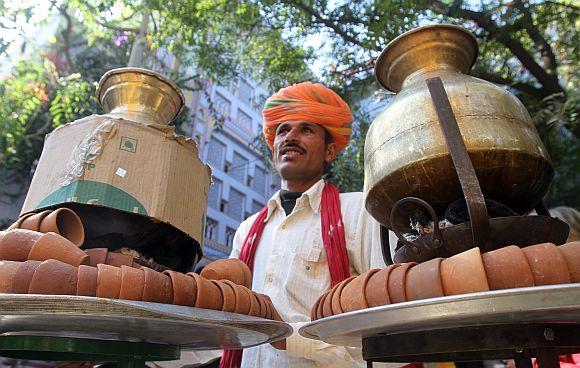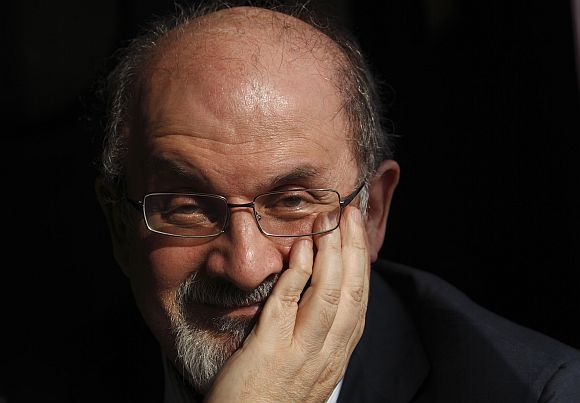Photographs: Reuters Abhishek Mande in Jaipur
The agony of waiting for Salman Rushdie, words of wisdom from Ben Okri and Amish Tripathi and a rather strange interaction with a Muslim activist who refuses to name the author he's protesting against. That was the second last day of the Jaipur Literature Festival, reports Abhishek Mande.
The festival, as William Dalrymple pointed out on Day One, had 262 speakers other than Salman Rushdie. The number of course, dwindled by at least four when Ruchir Joshi, Jeet Thayil, Hari Kunzru and Amitava Kumar were asked to leave when they read out passages from The Satanic Verses in protest of Rushdie's absence.
As Day Four dawned, the rumours of Rushdie addressing the audience via video conference -- which had been floating since the very first day -- got stronger.
And as yet another day went in anticipation of whether the author would put up an appearance or not, we were informed by Sanjoy Roy, the festival producer at the end of the day that Rushdie would indeed be there via video link and will address the session at 3.45 pm in the front lawns.
Click here for the full story
Click here for more Realtime News on the Jaipur Literature Festival!
'A man who drinks himself to death won't be accepted as a hero today'
In the session that was being moderated by Samit Basu, it was pointed out that while Indian movies seemed to derive their narrative from the novel, the European films derived theirs from short story.
Akhtar pointed out that as more people get exposed to newer cinema, there is a need to adapt to their tastes. The hero of a film, Akhtar said, always depicted the sensibilities and moralities of the age. A man who would drink himself to death because a woman turned him down would never be accepted as a hero today.
Gulzar then revealed the secret behind his fascinating storytelling. Every story, he pointed out, has a back-story and all one had to do was to explore those back-stories that would eventually make interesting characters and give birth to a great story.
Gulzar then released Javed Akhtar's latest collection of poems and requested him to read from it. The video above is from the reading.
Here's more of the session on Rediff Zara Bol. Scroll down to the end for gems from Akhtar and Gulzar among others.
Video: Abhishek Mande/Rediff.com
'It's only after you complete writing must you think of marketing it'
In a session on bestsellers, authors Amish Tripathi, Ashwin Sanghi and Amrita Tripathi talked about what it takes to write one. Tripathi who has written Immortals of Meluha and Rise of the Nagas, said that you cannot write a bestseller thinking whether it will sell or not. It must, he insisted, just flow and it is only after you complete writing must you think of marketing it.
Sanghi, who is best known for his most recent book Chanakya's Chant as well as The Rozabal Line that he wrote under the pseudonym Shawn Haigins, said that though he doesn't really put much thought in marketing his books, he is extremely active on social networking websites, which helps in the sales.
Perhaps the trickiest question came from a young girl who pointed out to Amish Tripathi that portraying Shiva as a marijuana-smoking cool dude would send out the wrong message to young impressionable readers.
Tripathi, who was obviously stumped by the question, confessed that this wasn't his intention and that having done marijuana himself once he advised young people against consuming it.
We also caught Tripathi on camera and we quizzed him about gods, demons and his competition. Don't miss the video above!
Video: Abhishek Mande/Rediff.com
Of madrasas, and the dreams
Image: Tahmima Anam speaks during a session at the Jaipur Literature Festival on MondayPhotographs: Abhishek Mande/Rediff.com
Bangladeshi writer Tahmima Anam spoke eloquently at her session in the Durbar Hall. Anam, author of The Good Muslim, talked about how the Bangladesh Liberation War had left an indelible mark on the psyche of the people of the generation that had seen and participated in it.
Anam whose The Good Muslim is the second part of a trilogy (of which A Golden Age was the first) has spent years researching about the lives of people in Bangladesh -- she is married and lives in London.
In an interesting observation, Anam also talked about how her views of madrasas changed after she visited one and spent time there.
In the girls' madrasa, she saw young girls who had made it their home because their parents couldn't afford to bring them up. She said she was most struck by the aspirations of the girls, none of who wanted to get married and settle down but rather continue their education and become teachers and doctors -- a dream they wouldn't be able to dream had it not been for the madrasas.
Anam also shed light on the active women's movement at the grassroots in Bangladesh, which she said was in part possible because of the NGOs as well as Professor Mohammed Yusuf's Grameen Bank.
"I may never know its International Women's Day in London where I live. But in Bangladesh, it is celebrated with great enthusiasm. Each time the Jamaat-e-Islam loses an election, they blame it on the NGOS and feminists," she laughed.
Ben Okri, Live!
Continuing with our series on authors speaking about their favourite books and authors, here's the Nigerian great Ben Okri talking about the Indian writers who he's loved and turns to for inspiration.
Video: Abhishek Mande/Rediff.com
Why I filed a petition to unban the Satanic Verses
Nilanjana Roy, who has started a petition asking the government to unban The Satanic Verses, spoke to me on camera on why she started the petition and that she stands by authors who chose to read passages from the book.
Roy also said that she hopes to get about 5,000 signatures in a week's time after which she plans to submit the petition to Prime Minister Manmohan Singh as well as Home Minister P Chidambaram.
Video: Abhishek Mande/Rediff.com
'I consider Rushdie to be a big criminal'
Image: Salman RushdiePhotographs: Reuters
Finally, since the Jaipur Literature Festival 2012 has been all about Salman Rushdie, here's an interview with Mohammed Saleem Engineer, the national secretary of the Jamaat-e-Islami-e-Hind who told me just why he is opposed to Salman Rushdie.
In the conversation that lasted a little over 10 minutes Engineer refused to name Salman Rushdie because he 'consider(s) him to be a big criminal' who 'has misused the freedom of expression to the extent that he has provoked the sentiments of the Muslim community'.
When asked if he'd read The Satanic Verses, Engineer, who told me he's an academic, that since it had 'been so much publicised, there is no need to read it'.
Do read, however, my rather strange interaction with the man who refused to name the author who he was protesting against.




article